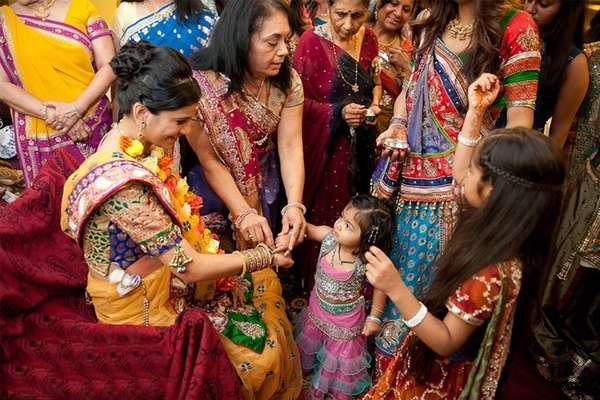
Godh Bharai Rasam- Indian Baby Shower Fun Rituals
22 Sep 2015 | 4 min Read
Prisha Lalwani (Mummasaurus)
Author | 71 Articles
Ushering in life (Having a baby) to this world takes the woman to a different level together! She is nurtured, cared for and celebrated with. In India, given the country’s cultural spectrum, there’s no one way even for the Indian Baby shower or ‘Godh bharai’ as it is popularly called. Most communities in India celebrate Godh Bharai in or after the commencement of the 7th month of pregnancy, as most pregnancies are considered safe at this point. Even if a delivery happens, chances are high that the baby will survive and grow healthy.
Here are a few ways and beliefs that people practise to celebrate the joy of the soon-to-arrive baby and of motherhood.
1. Godh Bharai – North India
On the day of Godh Bharai, the expectant mother dresses up in a new dress, wherein sometimes, the color is predefined or the dress is to be provided by her mayeka (Paternal Home). Godh Bharai includes rubbing special oils on the pregnant lady’s belly, and filing (Bharai) her lap (godh) with gifts for her and the soon-to-arrive child. Often guesses are made on the gender of the baby, names for each gender are suggested, with a dash of humor. All these activities take place around celebrations with community specific songs and dances, and application of ‘mehendi’ by an artist on the hands of the attendees.
For decades, the ritual of Godh Bharai has been a Women only affair however; modern day celebration can include men as well.
2. Shaad – Bengal
The Shaad differs slightly from the typical Godh Bharai in a way that it is NOT considered auspicious to bring gifts or other items for the baby to come. It is believed to draw a lot of “evil eyes” and may cause eventual harm to the mother and baby, even affecting the survival of them both. However, they prepare meals of the mother’s choice and feed her with her favourite foods, in a fit to feed her to her heart’s fullest. Other women family and friends are also invited over.
3. Seemandham – Kerala
This is usually performed in the 7th or the 9th month. Seemandham includes chanting of mantras for the development of the brain of the baby, and offering prayers to god for carrying the pregnant lady and her baby safely through delivery.
4. Valai Kaapu – South of India
The Valai Kaapu is a celebration in Tamil Nadu for a pregnant woman in third trimester, where a mother may wear a black saree to ward off any evil eyes. The mother is blessed by everyone in the gathering to protect her from any dangers she might face. The pregnant mother is made to wear green and red bangles on the mother, sing songs for her and offer gifts for the mother and the soon-to-arrive baby.
5. Dohale Jevan – Maharasthra
Dohale Jevan also includes the pregnant lady to be adorned with flower ornaments and a green or yellow saree. The lap of the lady is “filled” with five fruits that have seeds, a stick of turmeric and ‘kumkum'(vermilion). 5 ladies bless the pregnant women with wishes of safety and good fortune. The lady usually is made to sit in a Jhula or any other seat adorned with garland, flowers and decorations.
After her favourite food (Dohale Jevan) is served, the lady is made to choose between two covered bowls, which contain either a ladoo or a jalebi. If the bowl she chooses has a ladoo, the baby is predicted to be a boy, else a girl.
Modern Day Godh Bharai
IN the day, Godh Bharai is often organized by friends and peer groups as a surprise! There are some adaptations from the baby shower celebrations of the west, like taking a theme for a party, blended with Indian customs, making the celebration a fun event for everyone.
Ideally, a few communities do not believe in the ritual of Godh Bharai, assuming it to be a bad ritual to buy gifts, clothes and other items for a baby that has not yet arrived, keeping in mind that there may be a mishap, and then such gifts, clothes, etc make it difficult for the family to come out of the trauma.
A


Suggestions offered by doctors on BabyChakra are of advisory nature i.e., for educational and informational purposes only. Content posted on, created for, or compiled by BabyChakra is not intended or designed to replace your doctor's independent judgment about any symptom, condition, or the appropriateness or risks of a procedure or treatment for a given person.
